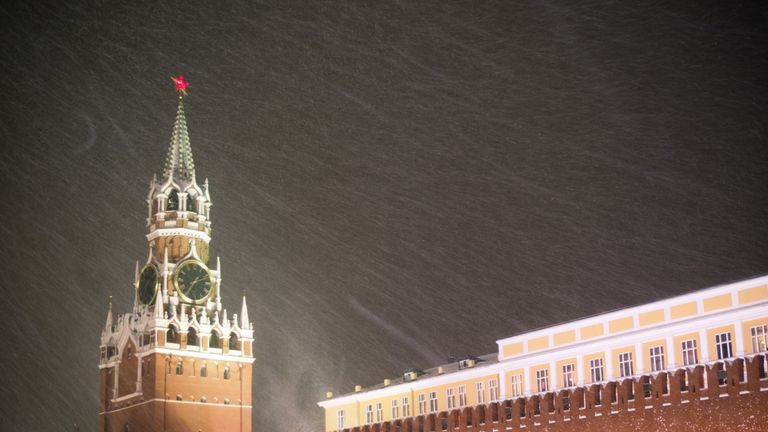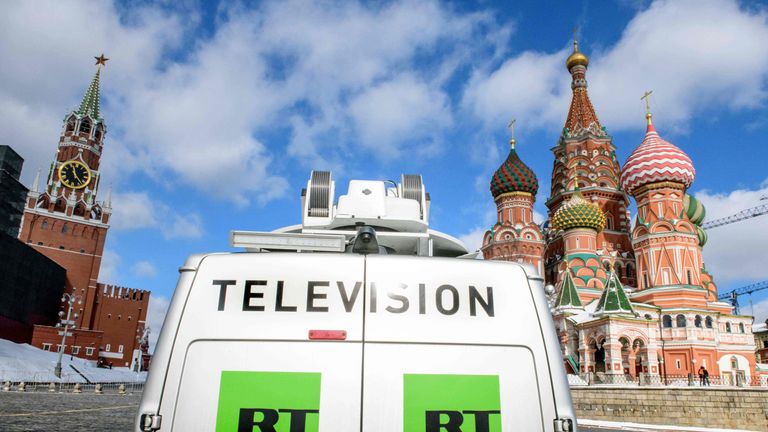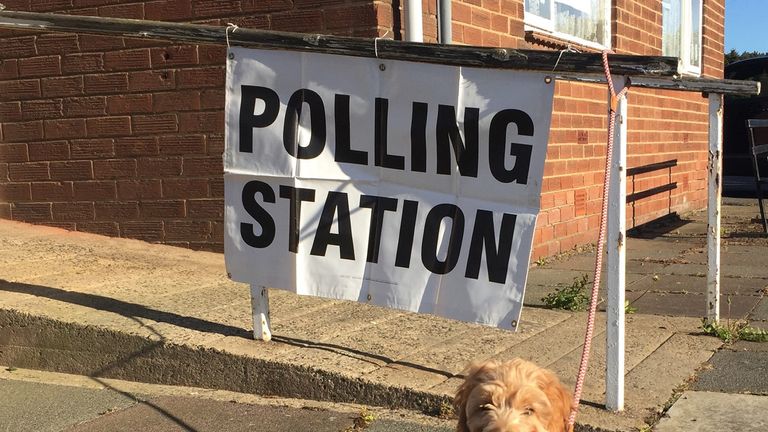£10m UK scheme to help stop Russia attacking democracies
The UK is thought to be the only European country building a grassroots network against false information.
Thursday 23 May 2019 22:05, UK
Britain is leading a fightback in Europe against efforts by Russia to attack democracies with fake news and disinformation, Sky News has learnt.
A £10m programme seeks to help a network of groups to combat what sources say is a long-term Kremlin goal to break up institutions like the European Union and NATO.
They accuse Russia of exploiting existing divisions within societies by amplifying the messages put out by far-right, anti-EU parties, particularly at election time, including this week's European Parliament polls.
"There is an ongoing threat to undermine state sovereignty particularly in Eastern Europe," a diplomatic source said.
The UK is thought to be the only European country building this kind of grassroots network against false information, which sources say is spread online, in print and in broadcasts by Russia-linked outlets.
The three-year Open Information Partnership gives grants, training and other forms of support to think tanks, academics and media outlets involved in fact-checking, investigative journalism and exposing fake news.
Some three dozen organisations in 13 countries largely in central and eastern Europe - where the challenge posed by Russia is most acute and the ability to counter it is most fragile - have already signed up to the initiative, which began this year.
One of these outfits is a think tank called GlobSec in the Slovakian capital of Bratislava.
Its researchers said Slovakia started to be hit by pro-Kremlin disinformation five years ago, around the same time as Russia's annexation of Crimea and the conflict in eastern Ukraine.
Daniel Milo, the head of a strategic communications programme at the think tank, said his country - occupied by the former Soviet Union when part of Czechoslovakia - is a particularly vulnerable target.
Many people are sympathetic towards Russia and have an anti-American predisposition.
"If you combine these two, add a bit of sugar-coating such as labelling Ukraine as a fascist state, the EU as pushing for some foreign alien, values, it is a perfect storm," Mr Milo said.
But the Kremlin's media operation, including Russian state broadcaster RT and online news outlet Sputnik as well as an array of social media accounts, is not the only culprit.
Certain elements within EU countries are suspected of using the same disinformation tools - playing on fears about immigration, gender and loss of sovereignty - to whip up support at a time of disillusionment with the more traditional political groupings.
"People saw this as a very easy way to score political points," said Mr Milo.
"This type of narrative - bashing the EU, bashing NATO, bashing the US - could win potentially political points and this has been manifested recently in the polls."
Research conducted by GlobSec shows that the far-right People's Party Our Slovakia is mentioned the most often on Facebook pages that it monitored for disinformation.
"Across central Europe, the monitored Facebook channels that often publish disinformation and pro-Kremlin content, actively promoted populist parties with a strong anti-migration and Eurosceptic agenda," it said in a report.
The aim, it said, is "to further the social and political polarisation on the European level".
One man who likes Russia, loathes NATO and dismisses any suggestion he's been influenced by Russian disinformation is 23-year-old archaeology student Peter Svrcek.
This young man is also the head of a self-styled militia called the Slovak Recruits, which he set up in 2012.
"I don't see the Russians as our enemy. I see the Russians as closely related culturally and I see them as an ally and that's how we should see them," he said.
"We have to learn to communicate with them. Because that is the basis of peace and stability in Europe.
"I don't agree with this fanaticism that leads to tension and escalation with Russia. This destabilises our central and eastern Europe."
His 200-strong paramilitary group made headlines last year when it conducted military-style training in Slovakia with a Russian biker group called the Night Wolves, which is under US sanctions for supporting pro-Russian forces in Ukraine.
Mr Svrcek even went on a short military training camp in Russia when he was 16, learning the fighting skills he says he now teachers his followers.
He appears far more suspicious of the activities of Britain, the United States and other Western allies than he is of Russia.
Asked whether he may actually have been manipulated into thinking that way by pro-Kremlin disinformation, he said: "I don't think that is the correct evaluation.
"Labelling these reports as disinformation creates a dangerous precedent and America is doing similar things. That's not OK. That's censorship."
Britain's push to fight Russian disinformation in Europe is being overseen by the Foreign and Commonwealth Office and run by a communications agency called Zinc Network.
A Foreign Office spokeswoman said the goal is to expand the support to more than 50 non-governmental organisations across the continent.
"Every partner is independent and is committed to sharing their knowledge, expertise and best practice with others, ultimately strengthening the collective response of European civil society to disinformation," the spokeswoman added.






